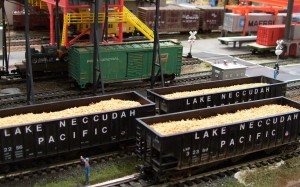But life for the Dunwell’s and Lake Neccudah would turn horribly wrong. In the summer of 1917 Samuel’s wife, Elise, would be brought down by an undiagnosed disease. Within months she had wasted away to nothing. With Samuel and Charles at her bedside Elise slipped away to be with the Lord on December 5, 1917. Samuel was devastated. Charles had lost his rock. And Edward, well, no one could find college boy. It was the beginning of harder times for many in this tight-knit farming community.
The War took its toll of many native sons before Armistice was declared. Then, in 1919 the 18th Amendment, or “Prohibition” was enacted. Overnight truck farms and big agribusinesses found themselves with no outlet for their crops. Support companies such as equipment dealers, machine shops, fertilizer companies and others lost the market for their businesses. Hundreds of locals found themselves with no means of support. Determined not to let their town die several influential men in town set a course for survival. Samuel, Charles, Gunther Heinz and others set out on an all out campaign to market Lake Neccudah to the country. The two main ingredients to beer, barley and hops, were also the two main crops grown in the area. Through extreme perseverance and sheer will these men began to find new homes for their crops. Local barley found its way into the largest soup company in America (Mmm- Good). Additionally, the malt that comes from barley scored another major marketing success at major chocolate candy manufacturers.

LNRR Hopper Cars
And, finally the community leaders struck crop gold by marketing barley as a significant fodder feed stock to ranchers throughout the Great Plains. Much of the hops crop found its way in to Canada, which was in the middle of its own “Prohibition” of sorts. During this time several hopper cars, rumored to be owned by Lake Neccudah Rail Road, and with reporting marks covered, were seen routinely at the Montana/ Canada boarder unloading cargo in the dead of night. “The Lake” had seen its way through the darkest of times.
A grateful town never forgot the efforts of these pillars of the community.
